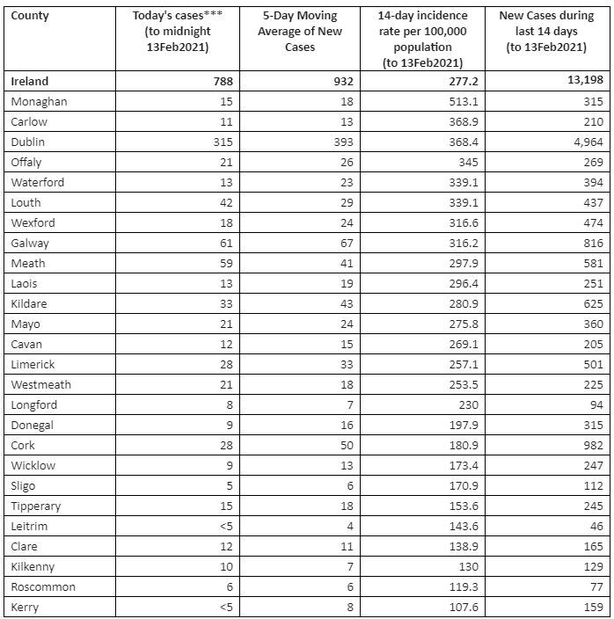The Department of Health has been notified of 17 further coronavirus-related deaths, with 788 new confirmed cases.
It brings the overall number of deaths to 3,948, while the total number of confirmed cases now stands at 209,582.
The department said 15 of the deaths occurred in February, one occurred in December, while the date of one death is still under investigation.
The median age of those who died was 80 years and the age range was 50-92 years.
Of the new cases notified today, 409 are men and 371 are women.
Of today's cases, 71% are under 45 years of age and the median age is 31 years old.
The national breakdown of cases is: 315 in Dublin, 61 in Galway, 59 in Meath, 42 in Louth, 33 in Kildare and the remaining 278 cases are spread across all other counties.
As of 8am today, 899 patients are in hospital with Covid-19. The number of people in ICU is down 11 to 160.

In Northern Ireland, a further 11 coronavirus deaths have been recorded, with ten occurring during the past 24 hours. It takes the official Department of Health toll to 1,996.
There were 176 new cases in the region. That is the lowest in a 24-hour period since 22 September.
There are 476 confirmed coronavirus patients in hospitals in the North, with 58 people in ICU.
Meanwhile, Minister for Health Stephen Donnelly said it is too early to say when Level 5 restrictions might be lifted.
Speaking on RTÉ's This Week programme, he said the number of close contacts per case and the percentage of positive cases in Dublin, are rising again.
Mr Donnelly's comments come as around 3,000 GPs and practice nurses are receiving their first Covid-19 vaccine today.
Mr Donnelly said he met Deputy Chief Medical Officer Dr Ronan Glynn following last Thursday's NPHET briefing for further details on the situation.
He said: "Close contacts are going up again, not a lot, but they are going back up again. Positivity rates remain high, particularly among close contacts. The percentage of new cases coming from Dublin is rising.
"We think there is more opportunity in terms of workplaces to help people to add extra protections as well. It's far too early given all of that to give accurate predictions."
On schools reopening, Mr Donnelly said there were "no fixed dates" yet for when this might happen, adding that Minister for Education Norma Foley is currently in talks on the issue.
We need your consent to load this rte-player contentWe use rte-player to manage extra content that can set cookies on your device and collect data about your activity. Please review their details and accept them to load the content.Manage Preferences
Asked how long the country faces under Level 5 restrictions, Mr Donnelly cited the new variants and their transmissibility, but said numbers needed to come down "much more" than where they were now.
He said the health advice from NPHET was unambiguous, adding that current modelling suggests if the virus remains suppressed at the current rate, the country could see between 200-400 cases per day by the end of February.
Mr Donnelly said that it was still possible for everyone in the country to be vaccinated by September, provided that expected supplies of approved vaccines were delivered on time.
He said the September date was an effort to give people a sense of where all people could be vaccinated by, provided all supplies of pre-purchased doses arrive, but added that AstraZeneca were already behind.
Asked why larger parish halls or hotels were not being used to carry out vaccinations, Mr Donnelly said an operational decision had been taken by the HSE, in conjunction with the IMO.
He said given the vulnerability of older age groups, they needed to be vaccinated in clinical settings.
Asked about medical professionals who may refuse to vaccinate themselves or others, Mr Donnelly said anyone who finds themselves in that situation can go to the HSE helpline to find a GP who will.
"I don't believe anyone in the country should be denied a vaccine by their GP, I don't think that’s acceptable at all," he said.
